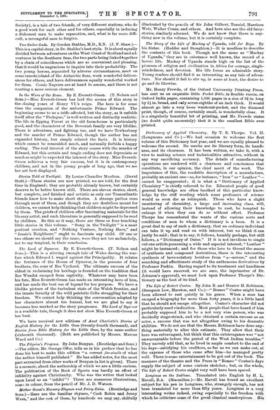Dictionary of Applied Chemistry. By T. E. Thorpe. Vol. II.
(Longmans and Co ) —We had occasion to welcome the first volume of this Dictionary last year, and we are equally pleased to welcome the second. Its merits are its literary form, its handi- ness, and its clearness. It has been written, we take it, with a view to making science and technicalities attractive, without in any way sacrificing accuracy. The details of manufacturing operations are rendered with a clearness and conciseness that constitute, in our opinion, the chief merit of the work. The importance of this, the readable description of a manufacture, probably an ancient one—as, for instance, " Iron " or" Leather "- cannot be exaggerated ; it is what a " Dictionary of Applied Chemistry" is chiefly referred to for. Educated people of good general knowledge are often baulked of this particular know- ledge by the stiff wording which some professors of science would as soon die as relinquish. Those who have a slight smattering of chemistry, a large and increasing class, will, instead of allowing their knowledge to rust, be tempted to enlarge it when they can do so without effort. Professor Thorpe has remembered the wants of the various sorts and conditions of men to whom a dictionary is a boon. It is a great deal to say of such a dictionary, that an ordinary individual can take it up and read on with interest, but we think it can justly be said ; that is to say, it follows, humbly perhaps, but still follows, a "Dictionary of Dates." If it is not invidious to single out one article possessing a wide and especial interest, " Leather " might be instanced ; and for those who love to thread the mazes of synthesis and compound derivatives, there is the interesting synthesis of hevo-rotatory levulose from "a—acrose," and the searching and affectionate study of the anthracene derivatives by Professor Perkin. Having regard to its treatment and handiness (it would have received, we are sure, the inprimatur of Dr. Johnson's approval), we must look upon Professor Thorpe's Dic- tionary as the best of its kind.


















































 Previous page
Previous page